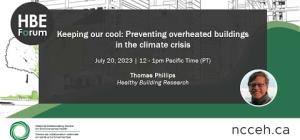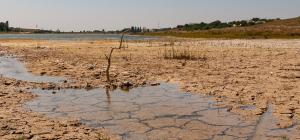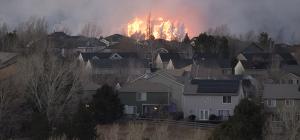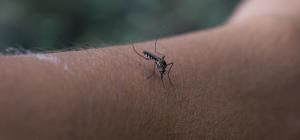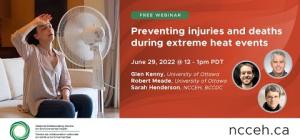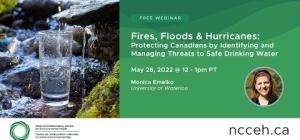
Extreme heat

Climate change is increasing the frequency, duration, and intensity of the number of very hot days in Canada. During heatwaves, the daytime and night-time average temperatures are projected to increase almost everywhere across the country, and heatwaves will become longer, hotter and more common than those in the past. Exposure to extreme heat will be most pronounced in three areas: low-lying areas in B.C. from the West Coast to the Rocky Mountains; the southern Prairies, including Alberta, Saskatchewan and Manitoba; and southern Ontario and Quebec. However, regions that have not experienced record-breaking temperatures in recent history and are not prepared for extreme heat may be most susceptible to the impacts.
Cities are more susceptible to extreme heat than suburban and rural areas because of the urban heat island effect. Urban heat islands elevate temperatures in cities compared with surrounding rural areas and amplify heat-related health impacts. Rural areas also suffer from heat-related effects but face distinct challenges in responding to extreme heat compared with urban centers.
The health impacts of extreme heat range from mild to life-threatening, depending on individual susceptibility, duration, and exposure. The symptoms of extreme heat exposure include heat rash, edema, cramps, and exhaustion. These symptoms can lead to heat stroke (loss of consciousness and death) or exacerbation of chronic conditions such as heart disease, kidney disease, and diabetes. Those most susceptible to extreme heat include seniors, people who are socially isolated or who live alone, and people with lower incomes. Many chronic conditions also put people at higher risk— a recent study comparing deaths from the 2021 BC heat dome to typical weather deaths during previous years found an increase in mortality for those with schizophrenia, chronic kidney disease and ischemic heart disease. Substance use disorder, diabetes, and depression are among other chronic conditions that can increase risk. The association between extreme heat and these chronic conditions is often the result of complex and interacting factors. For example, some specific mediations and illicit drugs are known to interfere with thermoregulation, such as antipsychotics and cocaine. Some mental illnesses are associated with stigmatization and social isolation, which are independent risk factors for extreme heat-related illness and mortality. Effective communication with the public before and during extreme heat events is essential to convey these health risks and encourage uptake of protective actions.
This subject guide aims to provide a list of curated resources about preparing for and responding to extreme heat events. The first section lists resources directed at individuals, households and communities, while the second section lists resources directed at public health professionals and policy-makers. Lastly, resources on risk communication for extreme heat events are also shared. For more information on preventing indoor overheating, please see our subject guide here.
Resources for individuals, households and communities
- Health checks during extreme heat events (NCCEH, 2022)
This tool helps support people doing heat checks, which are an important way to assess how people at high-risk of heat-related illness are doing during an extreme heat event. The tool provides information on how to assess whether someone is at risk, as well as how to recognize and respond to heat-related illnesses when encountered.
- Irreversible extreme heat: protecting Canadians and communities from a lethal future (Intact Centre on Climate Adaptation, 2022)
This guide outlines a series of actions individuals, property owners and managers, and communities can take to mitigate the risks of extreme heat events. Actions are divided into three categories: 1) planning and behavioural changes, 2) working with nature, and 3) improving buildings and public infrastructure.
- Extreme heat preparedness guide (Prepared BC, 2022)This guide provides advice for individuals to prepare and respond to an extreme heat emergency, including step by step instructions on developing an emergency plan, when to activate the plan, and tips for staying cool both inside and outside.
- Preventing injuries and deaths during extreme heat events (NCCEH, 2022)
This webinar reviews the effects of the 2021 heat dome in BC and highlights how individuals and communities can mobilize to improve preparedness for similar events in the future. An overview is also provided on how best to protect those most susceptible to extreme heat.
- Reducing the health effects of hot weather and heat extremes: from personal cooling
strategies to green cities (Jay et al., 2021)
This peer-reviewed article describes several accessible and sustainable interventions to reduce the risks of extreme heat and explores the barriers and opportunities for the implementation of these solutions in settings such as long-term care homes, workplaces, schools and mass gatherings.
- Climate Atlas of Canada (Climate Atlas, 2019)
This mapping tool allows users to zoom in on their region of interest and observe how climate change is predicted to affect the average number of very hot days (days over 30C) in a year, both in the near (2021-2050) and long term (2051-2080).
- Extreme Heat can be a Killer (NCCEH, 2018)
This videoprovides an overview of the rising temperatures in Canada, identifying those who are most at risk of heat-related morbidity and mortality during extreme heat events.
Resources for public health professionals and policy-makers
- Heat-proofing community housing: prioritizing extreme heat adaptation for vulnerable Canadians (Action Canada, 2023)
This report explores how policymakers can better protect community housing residents who are at a heightened risk for heat-related illness and death. Four recommendations specific to this issue are put forward.
- Health of Canadians in a changing climate: Advancing our knowledge for Action (Health Canada, 2022)
This report summarizes the latest research and knowledge on the effects of climate change on health and health systems in Canada, including populations most at risk of these effects. Chapter 3 highlights the impacts of natural hazards, such as heatwaves on human health, while Chapter 9 covers adaptation measures.
- Extreme heat: Heat Alert and Response Systems (HARS) across Canada (Health Canada, 2022)This webpage provides basic information on Heat Alert and Response Systems in Canada, including a useful figure illustrating the different components of a community HARS with preventative actions to reduce heat-health risks. A link to their guidebook on HARS is also provided.
- Analysis of community deaths during the catastrophic 2021 heat dome (Henderson et al., 2022)
This peer reviewed article analyzed data from the 2021 heat dome in British Columbia and found that deprivation and lower neighbourhood greenness were most predictive of risk of death. Implications for public health response are outlined.
- HealthyPlan.City (HealthyDesign.City, 2021)
This tool is designed to help planners, public health professionals and policy makers understand inequities across urban neighbourhoods by intersecting built environment variables (e.g., tree canopy cover or land surface temperature) with the percentage of vulnerable populations who live there.
- Urban heat island mitigation strategies: 2021 update (Institut national de santé publique du Québec, 2021)
This literature review provides an overview of measures to mitigate urban heat islands for decision-makers, public and private property managers, municipal stakeholders, non-profit organizations, and other project designers can adopt to ensure healthier and more comfortable living environments.
- Social connection as a public health adaptation to extreme heat events (Kafeety et al., 2020)
This commentary outlines how social connection can help protect those at greatest risk during extreme heat events and suggests several strategies public health agencies and their partners should consider to foster greater social connection at the community level.
- Reducing urban heat islands to protect health in Canada (Health Canada, 2020)
This report provides tips, strategies and case studies to help public health professionals support local governments and organizations to reduce urban heat islands in Canada, with advice focused on outdoor air temperatures in particular.
- Developing a municipal heat response plan: a guide for medium-sized municipalities (BCCDC, 2017)
This document provides best practices for how to integrate heat preparedness into existing emergency plans for communities with fewer resources.
Communicating the risks of extreme heat
- Recommendations for increasing the reach and effectiveness of heat risk education and warning messaging (VanderMolen et al., 2022)
This peer reviewed article summarized the results of focus groups with heat-vulnerable communities in California to elicit recommendations for increasing the reach and effectiveness of heat risk education and warning messaging. Key recommendations from these focus groups are discussed and are applicable in the Canadian context.
- Communicating Heat-Health Information to the Public: Assessing Municipal Government Extreme Heat Event Website Content (Zottarelli et al., 2022)
This peer reviewed article analyzed the content of U.S. municipal websites on extreme heat events and found a need for improved messaging, particularly around the breadth of populations at increased risk of heat-related morbidity and mortality, as well as the spectrum of actions that the public should take to reduce their risk.
- Global heat health information network: Communicate and advocate (Global Heat Health Information Network, 2021)
This webpage produced by an international team of extreme heat experts and policy makers, provides numerous resources and other learning opportunities on effective heat risk communication, awareness and advocacy campaigns.
- Communicating heat risk: Experiences from C40’s cool cities network (C40 Knowledge Hub, 2020)
This report provides guidance on communication strategies for reaching different heat-vulnerable groups and considerations for heat risk communication during the COVID-19 pandemic.
- Communicating the health risks of extreme heat events: toolkit for public health and emergency management officials (Health Canada, 2011)
This toolkit provides guidance on the best communication practices for addressing health risks from extreme heat, based on experience gathered both nationally and internationally.
This list is not intended to be exhaustive. Omission of a resource does not preclude it from having value.

